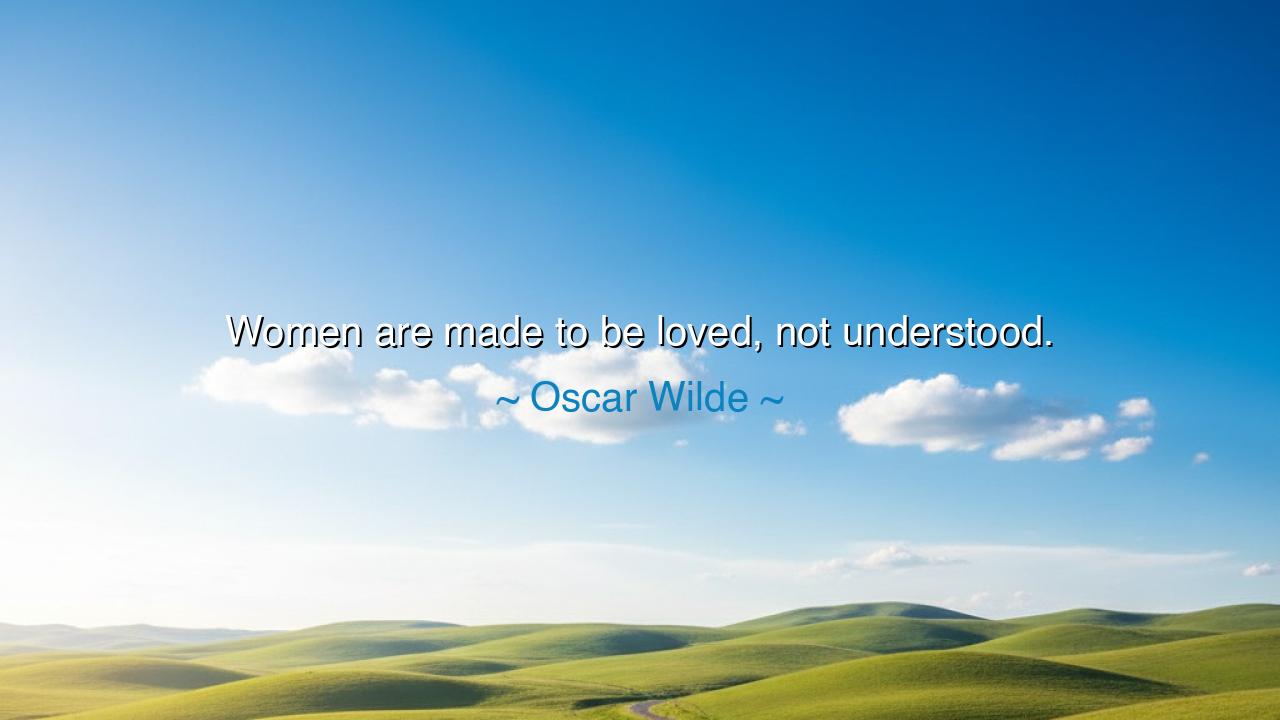
Women are made to be loved, not understood.






Hear the words of Oscar Wilde, who once declared: “Women are made to be loved, not understood.” This phrase, born from the wit of one of history’s sharpest minds, is not a dismissal but a revelation. For Wilde, master of irony and beauty, knew that the essence of love is not control, nor possession, nor the cold dissection of another’s soul. To seek only to “understand” is to reduce; but to love is to embrace mystery, to cherish without demand, to honor without condition. Thus, his words resound as both playful and profound—a reminder that love surpasses comprehension.
The meaning of Wilde’s words lies in the limits of understanding. Human beings, in their pride, imagine they can grasp the whole of another soul, map every thought, solve every contradiction. But a woman—like all of humanity—is not a puzzle to be solved, but a universe to be experienced. The attempt to fully comprehend reduces her vastness to a mere problem of reason. To love, however, is to stand in awe of her complexity, to find joy in her depths, to accept the unknowable as part of the beauty itself.
Consider the tale of Antony and Cleopatra. Roman generals and philosophers sought to “understand” Cleopatra—her politics, her allure, her ambitions. Yet none could capture her essence, for she was larger than explanation. But Antony, who loved her, entered into her mystery and was transformed by it, for better and for worse. Though their love was tragic, it reveals Wilde’s wisdom: understanding alone could never define Cleopatra’s power, but love embraced her as she was—a flame beyond reason, both destructive and divine.
The origin of Wilde’s thought may be traced to his own life. Surrounded by brilliance and beauty, he was both fascinated and tormented by the human heart. He saw how men sought to master women through rules, judgments, and rationalizations, yet failed to honor them as equals in spirit. In his paradoxical way, Wilde shattered such pretensions, saying in essence: Do not try to bind women with the chains of your reason. Rather, open your heart and love them, for their value lies not in being explained, but in being cherished.
And yet, his words should not be misunderstood as suggesting women are beyond dignity or respect. On the contrary, they remind us that love is the highest form of honor. To love is not to dominate, nor to simplify, but to exalt. Love is the recognition of another’s full humanity—their flaws, their contradictions, their brilliance. In love, one does not seek to dissect the mystery, but to dwell within it. Thus, Wilde’s paradox serves as a lesson not only for men, but for all who would approach another soul: love is the truest way of knowing.
The lesson is timeless: do not strive to explain away those you care for. Instead, honor them with affection, patience, and reverence. In relationships, let your first impulse be not to question endlessly, but to give. Ask not, “Why are they as they are?” but “How can I cherish them as they are?” For human beings, and women in particular, are not equations to be solved but stories to be lived. To love without demanding full understanding is to embrace life itself, in all its wonder and mystery.
So I say unto you: remember Wilde’s counsel. Women are made to be loved, not understood. Let these words be a torch against the coldness of analysis and the arrogance of control. Love first, and in loving, you will find a truth deeper than comprehension. For in the end, understanding fades with time, but love endures beyond reason, beyond measure, beyond death itself. And those who choose to love, even without full understanding, walk the path of the wise.






VCTrinh Van Chung
Wilde’s quote seems to play into the idea that women are inherently mysterious, something to be adored but not fully understood. While there is certainly an element of charm to the mystery of love, is it healthy to reinforce this notion? In modern relationships, shouldn’t mutual understanding be just as important as love? Can we really build a strong, lasting relationship on just love without understanding the deeper emotional complexities?
KLcao ngoc khanh ly
While Wilde’s quote is often viewed as a clever observation, I can’t help but feel that it oversimplifies the complexities of relationships. Is it realistic to suggest that women (or anyone, for that matter) should be loved but not understood? In my opinion, true love requires both: an emotional connection and a deeper understanding of each other’s feelings, thoughts, and needs. Can we really separate love from understanding?
TNLe Thi Nghia
I find Wilde’s statement intriguing because it suggests that love and understanding are separate concepts. It almost hints that love is a simpler or more natural emotion, while understanding requires effort. But how does this affect the way we approach relationships? Can we truly love someone without making an effort to understand them, or does love require a deeper connection and effort to truly understand each other?
UGUser Google
Oscar Wilde’s quote strikes me as both poetic and problematic. While it may capture a sentiment about the mysterious nature of women, it also seems to imply that understanding women is unnecessary or unimportant. Shouldn’t the goal be to understand and love each other equally? Is love really enough if we don’t take the time to understand the people we care about, regardless of gender?